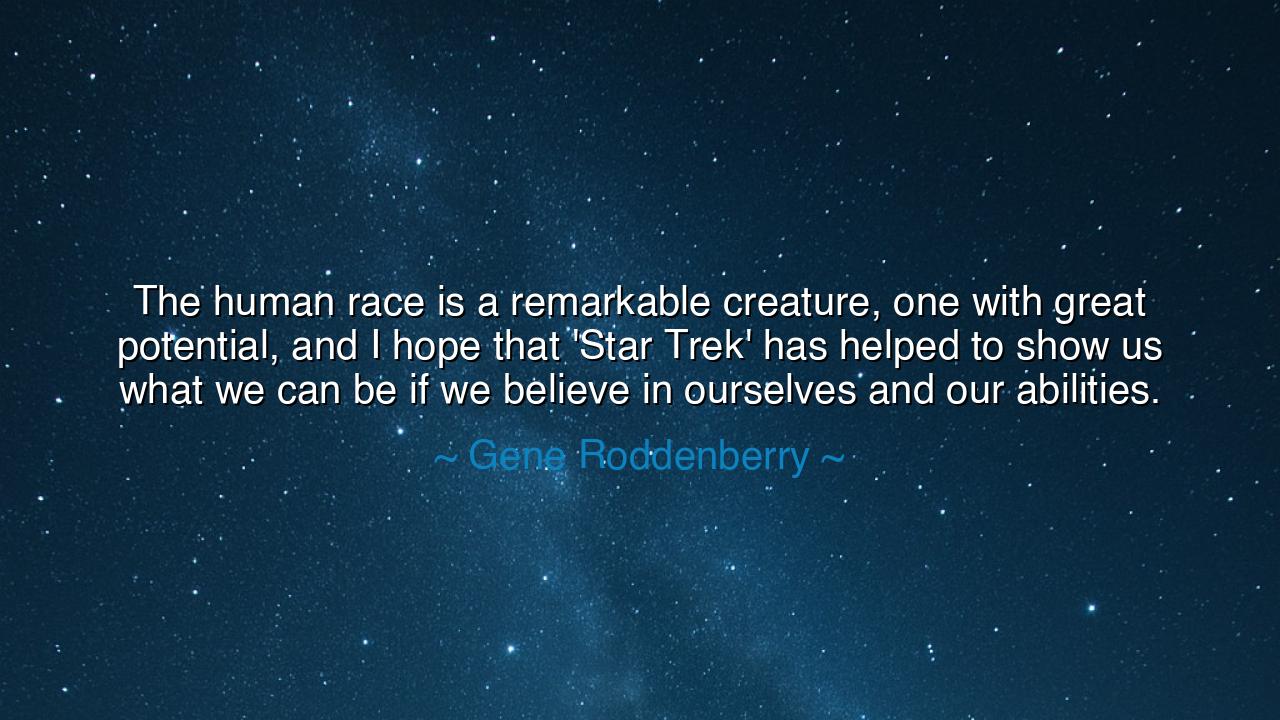
The human race is a remarkable creature, one with great
The human race is a remarkable creature, one with great potential, and I hope that 'Star Trek' has helped to show us what we can be if we believe in ourselves and our abilities.






The words of Gene Roddenberry, creator of Star Trek, resound like a hymn for the ages: “The human race is a remarkable creature, one with great potential, and I hope that 'Star Trek' has helped to show us what we can be if we believe in ourselves and our abilities.” In this declaration lies both a prophecy and a call to arms — the vision of humankind not as it is, but as it might become. Roddenberry spoke not only of ships and stars, but of the inner voyage of the soul — a journey toward enlightenment, courage, and unity. His words remind us that though we are bound by the dust of the earth, we are destined for the stars, not through engines of metal, but through the power of the human spirit.
In ancient times, the sages spoke of potential as the divine seed within all things — the oak hidden in the acorn, the fire dormant in the stone. So too did Roddenberry see in humanity a spark that could illuminate the universe. He dreamed of a world beyond greed and division, where reason and compassion guided our destiny. His creation, Star Trek, became not merely a story, but a mirror of our aspirations — a myth for a modern age. As the epics of Homer stirred the Greeks to courage, so did Roddenberry’s vision stir the hearts of dreamers, scientists, and explorers, reminding them that the future is not found but forged.
Yet Roddenberry’s hope was not blind. He knew that the human race, for all its genius, carried within it the shadows of war, prejudice, and pride. He had seen the fires of the twentieth century — the wars that scorched continents and the bombs that split the atom and the soul alike. But from those ashes, he chose to dream of light. Like the philosopher Marcus Aurelius, who wrote of reason as the divine within man, Roddenberry believed that the same mind capable of destruction was also capable of peace, invention, and transcendence. To believe in ourselves, then, is not arrogance — it is the sacred duty of beings aware of their own power.
Consider the story of Neil Armstrong, who, in 1969, stepped upon the moon and spoke the immortal words: “That’s one small step for man, one giant leap for mankind.” In that moment, the dream of centuries — the yearning to reach beyond our limits — became flesh and fact. But it was not the work of one man; it was the triumph of many minds believing in the possible. Engineers, thinkers, dreamers — all played their part, proving that when humanity unites in belief and purpose, it can turn what was once myth into memory. This, too, is the essence of Roddenberry’s vision: that the path to the stars begins not with rockets, but with faith in human potential.
There is an ancient teaching that says, “He who knows his power and does not use it is as one who hides fire beneath the ash.” The same is true for our age. Too often, we doubt our worth, forgetting that every innovation, every act of kindness, every work of art is an echo of divine potential. Roddenberry’s words remind us that we are remarkable creatures, capable of both terrible folly and transcendent grace. The question he leaves us is not whether we can be better, but whether we will choose to be.
From his imagination came a universe where races and worlds stood together as equals, where curiosity was the highest virtue and fear the only true enemy. Such a vision is not fantasy — it is a map of the possible. To believe in our abilities is to take the first step toward that horizon. It means to educate not only the mind but the heart, to wield technology not for profit but for the good of all. It means to look at the unknown not with terror, but with wonder.
Therefore, let the teaching of Gene Roddenberry be remembered as both dream and duty: Believe in yourselves. Believe in your kind. For faith in humanity is the fuel of every star we shall ever reach. Build, explore, forgive, and imagine — for these are the tools by which the human race becomes truly remarkable. And when doubt whispers that the stars are too far, remember that every voyage begins with a single step, and every light in the heavens was once just darkness — until someone dared to believe it could shine.






AAdministratorAdministrator
Welcome, honored guests. Please leave a comment, we will respond soon